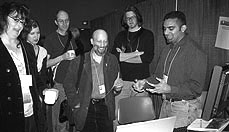JPEG2000 Implementation at Library and Archives Canada 
Pierre Desrochers, Library and Archives Canada, Canada
Brian Thurgood, Library and Archives Canada, Canada
Marc C. Houle, Library and Archives Canada, Canada
http://www.collectionscanada.ca
JPEG2000 is a relatively new international standard for image compression developed by the Joint Photographics Experts Group (JPEG). It was developed to provide the advantages of advanced wavelet compression to institutions that have digital archives while eliminating the concerns associated with proprietary compression and file formats. JPEG2000 allows cultural institutions such as Library and Archives Canada to preserve culturally significant digital objects using lossless compression while providing higher performance and new features not possible in other file format types. This paper discusses the initiation, planning and implementation of the pilot project for JPEG2000 at Library and Archives Canada. What is the scope of the pilot project? If we are to implement JPEG2000 as a multiphased project, what are the implementation stages? If we convert images to the new format, how many and what type of images are converted? What are the higher performance and new features of JPEG2000 that are not possible with other file formats types? What are the risks assumed with implementing JPEG2000 in a cultural institution? What are the significant advantages of using this image compression standard for the Web? How cost effective and relevant is JPEG2000 to museums?
Mini-Workshop: JPEG 2000 [Technology]
Keywords: digital collection, JPEG2000, Library and Archives Canada, archiving, image
